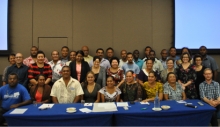Youth trade union training course

PSI contributed AUD 5,000 (approx. EUR 3,000) toward the event. The Queensland Branch of the Maritime Union of Australia provided the venue.
The training was organised by the South Pacific Oceania Trade Union Council (SPOCTU) in conjunction with ILO, New Zealand Council of Trade Unions (NZCTU), Australian Trade Union Council (ACTU) and Australian Trade Union Aid organisation (APHEDA). The two-day programme coincided with a two and a half day ILO-ACTRAV and half day SPOCTU meeting, which the youth attended.
PSI was represented by three of the 13 participants, the young unionists came from Vanuatu (VNWU), the Cook Islands (CIWA) and Tonga (TPSA). Additionally, Stella Te Ariki from affiliate NZ PSA, PSI Oceania SRS Michael Whaites and former Oceania Women’s Committee rep Kuini Lutua (formally Fiji Nurses Association now working with NUCFCW Fiji) were facilitators.
Day one of the training explored union values and mapped out the Strengths, Weaknesses, Threats and Opportunities facing unions in the region. Participants then mapped out the key areas of concern within the region. Many issues link to PSI’s global plan of action.
Regional issues noted by the participants were:
- Climate change
- Communication / Network
- Unstable government
- Independence (West Papua New Guinea)
- PACER + (Free Trade Agreement)
- PICTA
- Seasonal Workers
- Labour mobility
- Migration – better job opportunities
- Unemployment
- Under employment
National/Political issues of note were:
- Austerity
- Gender inequality
- Corruption
- Casualization of work
- Military rule – anti-democratic
- Anti-union government
- Collapsed union
- Privatisation of Public Sector
- Cheap foreign labour
- Short term contractors
- Retirement age
- Minimum wage (too low and not paid)
- High cost of living
- Urban drift
- Conflict between multinational firms actions and the country’s laws
- Neo-colonialism
- Instability in political systems
Day one concluded with a site visit to unionised workplaces or union offices. Later in the week, PSI affiliates from the healthcare sector (a young nurse from Tonga and a young nurse from the Cook Islands) visited the offices of the Queensland Nurses Union to discuss issues affecting nurses across the Pacific. Later in the week, PSI nurse affiliates visited the Queensland Nurses Union to share experiences.
On the evening of the first day, participants attended a local rally that highlighted the issue of refugees being deported from Australia. The #LetThemStay rally was called by religious organisations and was supported by the Queensland branch of PSI affiliate, the Electrical Trades Union (ETU). For many of the young unionists this was the first time that they had attended a rally; they found it very inspiring.
Day two of the training provided participants the opportunity to hear about four “showcase” campaigns from the region. One of the campaigns was the successful “Not For Sale” community campaign carried out by the Queensland branch of the ETU. This campaign used low cost techniques of one-to-one community discussions and town-hall meetings to talk about the impact of privatisation. The campaign lobbied candidates in the State election with the slogan “Put the Liberals Last”. This campaign educated and mobilised members.
Another showcase highlighted a recruitment campaign in the private sector by young unionists in establishing the First Union in Samoa. In one week they recruited 1000 new members to the union. They found that the major issue was the non-application of the existing labour laws including minimum wages. This case highlighted the possibilities when you connect union values to the issues raised by workers locally and that in many cases people don’t belong to a union simply because no-one has asked them to belong.
Day two concluded with a half-day session on campaign design. The group was asked to vote on which four of the previously identified issues they felt were most important. The four identified campaign areas were:
- Delayed payment of wages
- Low minimum wage
- Extended / long hours
- Corruption
The groups worked on a plan based on five questions and then looked at how these would be extended into more detailed campaign plans.
The next step is to provide on-going mentoring for the participants and there is an opportunity for PSI affiliates across Oceania to do this.

